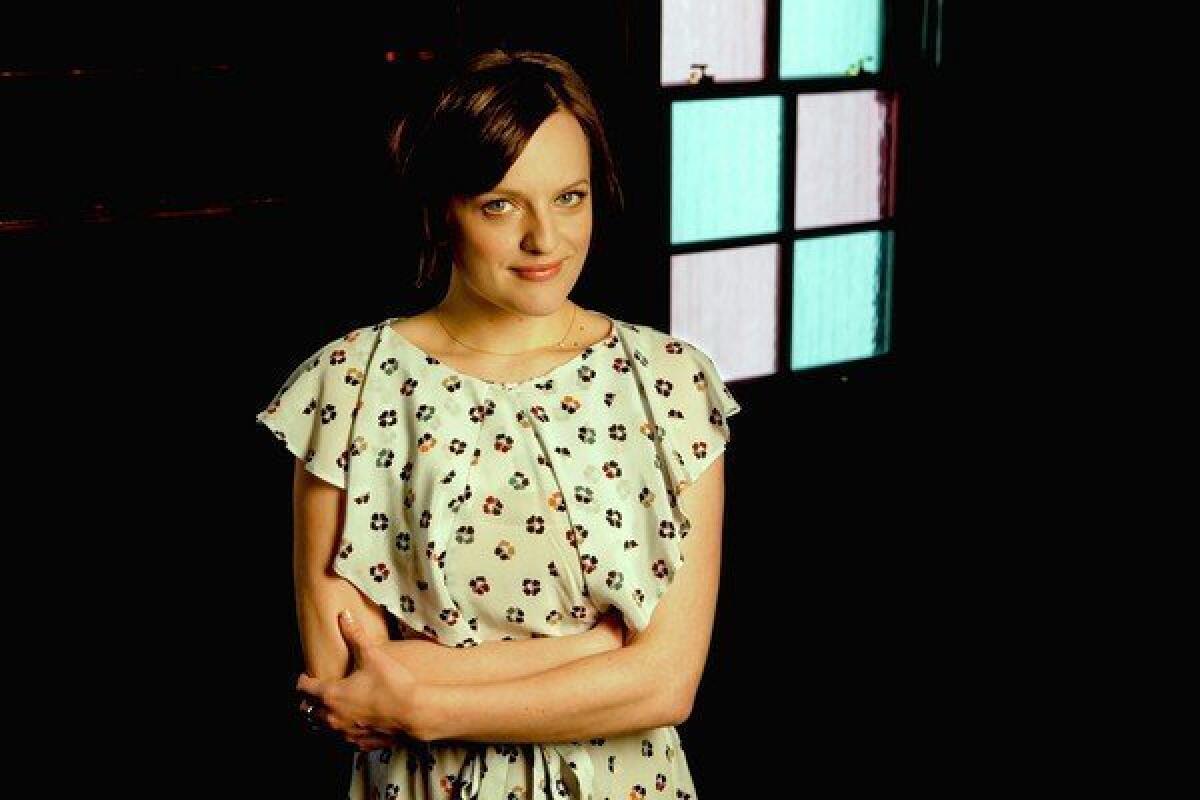‘Top of the Lake’ star Elisabeth Moss savors miniseries’ nuances

- Share via
It’s a sun-soaked afternoon in Los Angeles, but Elisabeth Moss is shivering. Sitting in the back room at the Pikey on Sunset Boulevard, Moss recalls how cold the water was in New Zealand, where she filmed “Top of the Lake,” a miniseries created by Jane Campion that premieres Monday on the Sundance Channel.
“The lake is the same temperature all year round: freezing,” says Moss, wearing a loose white cotton dress, her short brown hair tucked neatly behind one ear. “My makeup artist had this black plastic bucket and they would fill it with hot water and I would go sit in it fully clothed to warm up.”
It’s an odd detail, but it’s in keeping with the making of the moody crime drama, filmed over a five-month period against a staggeringly beautiful natural backdrop of soaring mountains, rugged bush and the omnipresent lake. The setting plays a natural foil to the darkness of the plot, driven by the disappearance of a pregnant 12-year-old named Tui. Moss plays a confused and hardened Sydney, Australia, cop named Robin who gets wrapped up in the case during a visit to her cancer-stricken mother.
PHOTOS: Celebrity portraits by The Times
The mystery reveals itself in unexpected ways during seven hourlong episodes. The length of the series allows delicate subplots to push to the surface, including the story of Paradise, a desolate refugee camp for lost, mostly menopausal women, silently lorded over by an enigmatic visionary named GJ, played by Holly Hunter. Then there’s the taut drama surrounding Tui’s father, a criminal named Matt Mitcham (Peter Mullan) who rules the town and its police through the sheer, rabid force of his violent will.
“I think this is Jane’s best work. She really thrived in the miniseries genre,” says Moss. “It’s in the details for Jane. It’s all about the secondary characters, the locations and all the weird moments — all the extra things that make Jane a genius. If you cut it down to two hours you’d make an awesome detective story, but you’d lose all that great stuff.”
Making a miniseries did, indeed, give her room to play, agrees Campion.
“My favorite form is the novel,” she says, speaking by phone from Jodhpur, India. “Which I think adds up to six or seven hours of something beautiful. That’s what I was trying to create.”
Campion recalls how watching the salty HBO drama “Deadwood” made her realize that modern television was the place for her.
“I thought, ‘My God, this is so brilliant, I can’t believe someone in television is financing this,’” she says. “How wild, what a revelation!”
Campion’s feeling that anything goes on the small screen translated to some genuinely brave directorial choices, particularly when it comes to the world of Paradise, the camp by the lake. Here the women live in empty shipping containers and there is a sense of weird, wind-swept desolation that easily conjures “Twin Peaks” comparisons.
FULL COVERAGE: Television reviews
“TV is being written, directed and acted for adults,” says Holly Hunter, addressing the strange world of the camp. “It’s bringing complexity to a lot of different stories, characters and landscapes.”
In the case of Paradise, that sense of richness and possibility plays out among women that Campion says are “probably the most unattractive group of women in the world”: menopausal and post-menopausal.
“But I’m one of them,” she says. “And there’s a lot of freedom to it. You skip out of all the conventional points of success. You’re not hot, you don’t have a hot body.”
Through Paradise we see the vulnerability and power of women, and Tui’s disappearance becomes that much more upsetting. The evil embodied in the show, however, is as amorphous as the constantly shifting weather.
“Even though there are people who do very bad things in ‘Top of the Lake,’ those people still get a lot of humanity shined on them through Jane and Gerard Lee, her co-writer,” says Hunter. “I think they both love people and they love all their characters.”
It had been a long time since Campion had written with Lee, who she says was living on an island off Brisbane in Australia when she called on him to collaborate. His voice was vital because he could awaken the male point of view alongside her female point of view. Sexuality and sex roles are a bit murky, along with just about everything else in “Top of the Lake.”
That’s certainly true when it comes to Moss’ Robin, who has held onto bleak secrets that have twisted her to hardened extremes. Thanks to her role as Peggy Olson on “Mad Men,” Moss knows a thing or two about infiltrating male-dominated worlds. But that’s where all comparisons between the roles stop.
Campion says Moss wasn’t who she had in mind when she was writing the role but that it quickly became apparent during casting that she was the correct choice.
“I always want to know more about her,” says Campion of Moss. “She’s a bit like the Mona Lisa, she shows you something, but there’s so much more.”
For her part, Moss says she was both thrilled and terrified to carry the show. But it wasn’t until filming was over that she realized the full scope of what they had made.
“They showed this clip they edited together at the end of filming, and by the end tears were just streaming down my face,” says Moss. “It was like watching my life for the past five months being played back at me.”
PHOTOS, VIDEOS & MORE:
PHOTOS: Behind the scenes of ‘Downton Abbey’
VIDEO: Winter TV preview
PHOTOS: Violence in TV shows
More to Read
The complete guide to home viewing
Get Screen Gab for everything about the TV shows and streaming movies everyone’s talking about.
You may occasionally receive promotional content from the Los Angeles Times.







